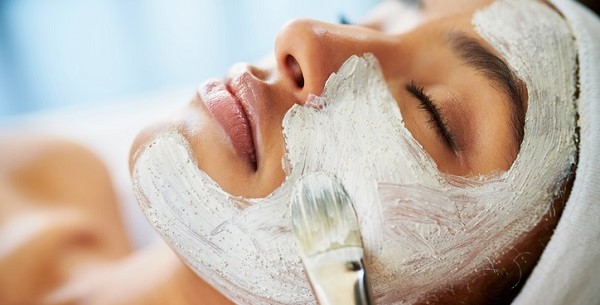Determining which type of professional facial is the right type for you may seem complicated, but it doesn’t have to be. All it takes is identifying your biggest skin concerns, and being open with your beauty therapist. Even if you skim the rest of this article, make sure to remember this: the most important thing to do when determining the best pro facial for your skin is to share your concerns with your beauty therapist and trust her recommendations! There are hundreds, if not thousands, of different types of facials out there, and trusting a great beauty therapist is your best bet to get skin that’s younger-looking, glowing and healthy.
Why do I need a professional facial?
Here’s some skin science: Your circulatory system’s ability to nourish your tissues and remove toxins and waste (and help prevent premature age signs like wrinkles and sagging) actually starts to slow down in your early twenties. Combine that with hormonal breakouts, sun damage and poor diet, and you get a multitude of reasons to get a facial – at any age, and no matter what (if any) skin aging or damage has shown up on your skin. Pro facials are a way to counteract both visible aging, and the ‘unseen’ damage that is about to surface.
What signs tell me I need a facial?
- Dullness
- Congestion
- Acne
- Excess oil production
- Sagging
- Puffiness
- Fine line/wrinkles
- Dark circles
- Large pores
- Redness
- Rough texture
- Pigmented spots
Facial types + benefits
Bioelements has an infinite number of pro facials thanks to signature Custom Blending System, which allows your beauty therapist to completely tailor a spa facial just for your exact needs.
There are many different specific treatments aside from the Custom Blend Facial, all designed to tackle very specific and personalized skin concerns:
- Firm & Lift Facial for sagging skin
- Calming Facial for visible capillaries and redness
- Depigmenting and Brightening peel for dark spots and hyperpigmentation
- VitaMineral Deep Detox Facial to detoxify congested, dull sluggish or lazy skin
- Ultra-Detox Chemical Peels for those with dull, rough-textured skin, chronic blackheads, enlarged pores, excessive milia, lines, and wrinkles, and hyperpigmentation
There are so many more types of facials out there besides those listed above, but how do you choose the right one?
What type of facial should I get?
Trust your beauty therapist here. An experienced, great beauty therapist will ask you a multitude of in-depth questions – regardless if you’ve ever received a facial before or not – in order to accurately determine what’s best for your skin. In fact, if your beauty therapist doesn’t ask you any questions, then you should leave the spa immediately.
What should I tell beauty therapist before my facial begins?
Even if your beauty therapist doesn’t ask each one of these questions, make sure you should still give her this information:
Your diet (including recent changes)
- Current medications (especially if you’ve started a new one recently)
- Allergies
- Medical conditions
- Lifestyle choices
- Recent activities (If you were out late the night before drinking, be sure to let them know so they can give you the more hydrating facial that your skin needs. If you’ve been sleeping poorly, let them know so they can focus on dark under eye circles or other signs of sleep deprivation, etc)
- Recent plastic surgeries or procedures
- Activity level
- At-home skin care routine
- Stress level
- Past skin reactions
- What you want to get out of this pro facial
It’s important to answer each of these questions with in depth answers to give her the full picture and properly prepare for a facial.
Your beauty therapist should be making her own observations in addition to the information you provide. Bioelements beauty therapists will perform a SkinReading every single time you get a facial. SkinReading is our signature technique for “reading” your skin for any information you may have forgotten to tell us. This helps our beauty therapists determine the right type of salon facial for you. All beauty therapists, Bioelements or not, should perform some sort of assessment of your skin, otherwise they won’t be able to maximize the results from your professional skin.


